The program of "The Cry for Peace"
Prayer for PeaceOn the respective days you will find the tiltes of the Forums and their descriptions, names of speakers and other information.
Climate change, Climate crisis: beyond denialism, the planet has long been crying out its distress, while extreme events that have always and increasingly affected the poorest countries have become ordinary experience even in the richest countries. Drought, hunger, exploitation of the earth, major migrations, pollution, development patterns. The response will either be global or it will be a no-response at all. The right to international refugee protection is a great achievement of the UN and the world in the face of persecution and war. In 2022, 93 million human beings are forced refugees, but another 180 million, migrants, live outside their homelands. On top of that there are climate refugees, and the line between economic, environmental, political, and religious refugees is increasingly blurred. But migrants are not only a problem for the world, they can also be a great opportunity: it depends on the policies of reception, recognition, integration In a fragmented world, a weak life is most at risk, and defending the lives of those who are most fragile, marginal, can be presented as an unaffordable luxury. But life itself is relationship, we do not give it to ourselves, it contains the other, the need to recognize the other, the unity of humankind, even in times of war, even when entire societies are tempted to turn the extra years of life which have been gained into a problem and a "curse." Every generation is called to find the energies and ways to live with each other and to give dignity to the weak life. There is no lasting peace after conflicts without deep reconciliation and recognition of the other. There are questions within every culture and religious tradition about prayer: What is it for?, What is it?, Who is fit to pray? Prayer, as whatever helps most in life, like air, friendship, love, "goes unseen." Yet it is the greatest resource for change that every generation, for millennia has had at its disposal: a weak force indispensable for finding the ways to peace, which is the very, unifying name of God. The Fall of the Berlin Wall gave the world hope and accelerated the road to the formation of a united Europe, to a Union as a major world actor of stability and peace. Wars have not disappeared, but they have multiplied, and the war in Ukraine alone threatens to disrupt globalization, cooperation between countries and peoples, and lifestyles in a non-occasional way, bringing its terrible consequences to a large part of the planet but also among Europeans. On the ability to foster dialogue and ways of peace even in times of war depends much of the future of Europe and its role in the world. In times when the world and peoples seem to be losing the taste for unity and where force and war are gaining ground as popular instruments of conflict resolution, all believers and Christians are concerned. Ecumenism and a new language of dialogue among Christians can help heal the world of divisions and foster paths of reconciliation that seem impossible, as they did at the end of World War II. Easter is the foundation of Christian life and the resurrection of the world. A common date for the celebration of Easter today is possible. It has become a necessity. In the Bible, God's Word is Word that creates, that fulfills what it promises and makes to be, it is not removed from history, it is Word-that-makes-history. World history is not linear time, and there are seasons when it is more difficult to see and imagine a future capable of eliminating the sufferings and distortions of the present: "The word of the Lord was rare in those days, visions were not frequent" (I Sam. 3:1). In the Word of God there is also the secret of not flattening on the present and generating future with God's imagination and friendship for every woman and man. Religions have been used in so many ages and even recently to wage war and make war with one another better, this has hollowed them out, made them caricatures. They used religious words for hatred and for the elimination of the other. This happens in precise places in the world, as well as in the hearts of so many people. But religions can be, when they enter into the depths of themselves, water to extinguish the fires of divisions and distortions that prevent us from seeing in others our brothers and sisters and fellow human beings. In a time of pushes for political, ethnic and social divisions, of the resurgence of aggressive nationalisms, religions can help to rediscover what unites rather than what divides: a new responsibility for peace. At the height of the Cold War and the rebirth of many of the world's countries after World War II, 17 years after the bombs of Hiroshima and Nagasaki, at the height of decolonization that progressively emancipated Africa from centuries of European colonialism, the "Cuban crisis" confronted the world with the real risk of nuclear war and self-destruction. The protagonists had the names of Nikita Kruschev, John F. Kennedy, and Pope John XXIII. The risks implicit in an escalation that must answer to one's public opinions and apparatuses rather than to the supreme good of security and peace for all, the possibility of a "nuclear accident" capable of triggering a chain reaction, 60 years later, acquire dramatic relevance and a lesson for the present. "The Mediterranean is a thousand things at once. Not one landscape, but countless landscapes. Not one sea, but a succession of seas. Not one civilizatioǹ, but it is a series of civilizations̀ stacked on top of each other, in short, a very ancient crossroads. For millennia everything has flowed into it, complicating and enriching its history: beasts of burden, cars, goods, ships, ideas, religions, ways of life" (F.Braudel). War has again, powerfully entered the Western world in the 21st century. Every war promises to be short and decisive, but all wars are self-perpetuating, open to scenarios unthinkable before they began, unpredictable. They depend on the decisions of a few but involve everyone. The food crisis, social and political instability now affect not only the populations of warring countries, neighboring countries, but the rest of the world, other continents, dialogue and the world's geo-political rifts. We need to rediscover the ways of dialogue and multilateralism to patch up the world's wounds and reopen to the taste of peace. Covid-19 touched the whole world, without exception. In the West it seemed a distant thing: but it was not an epidemic, it was not an isolated event, it was and is a pandemic. Global. With its load of victims. The world, in the spring of 2021 stood still, found itself united, silently. So did every country, standing around its victims. The pandemic does consider borders, it does not respects frontiers, language differences. But it disproportionately affects, more than others, in every society, the weakest. The pandemic is a great temptation and a great opportunity: to think only of oneself, or to regain a feeling of common belonging. Globalization has in recent decades unified markets and brought populations closer together. Unfinished globalization has found itself in a distress, contradictory to the free movement of goods, but not of people and nations. Globalization broke down, after a rise in tensions, with the war in Ukraine and its aftermath. The globalization of spirit and solidarity has never been there, it has not grown on par with the wealth produced, while inequalities have grown exponentially. Religions have before them the responsibility to help everyone to think of themselves together with the other and not against the other, across personal and national, ethnic, religious, social boundaries. For a new globalization.17:00
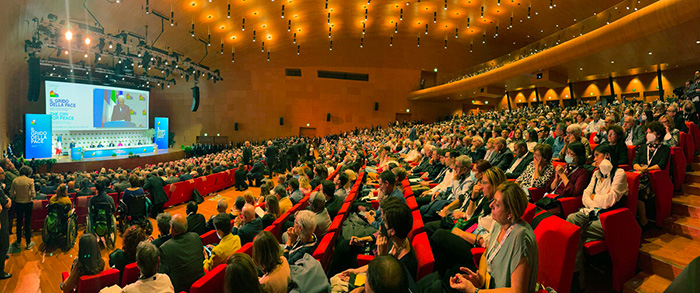
Modera
Relatori
Andrea Riccardi
Historian, Founder of the Community of Sant'Egidio
Emmanuel Macron
President of the French Republic
Matteo Zuppi
Cardinal, Archbishop of Bologna, President of the Italian Bishops' Conference
Haïm Korsia
Chief Rabbi of France
Shaykh Muhammad bin Abdul Karim al-Issa
Secretary General of the Muslim World League
09:30

Modera
Isabelle Rosabrunetto
Director General of the Ministry of Foreign Affairs and Cooperation, Principality of Monaco
Relatori
Kpakilé Félémou
Community of Sant’Egidio, Republic of Guinea
Juan Grabois
Founder of the Confederation of Workers of Popular Economy (CTEP), Argentina
Gillian Kingston
Vice President of the World Methodist Council
Michael A. Köhler
Deputy Director-General, DG ECHO - European Commission
Sudheendra Kulkarni
Hindu, Founder of the “Forum for a New South Asia", India
David Rosen
Rabbi, Special Advisor to the Abrahamic Family House (AFH) in Abu Dhabi, Israel
09:30
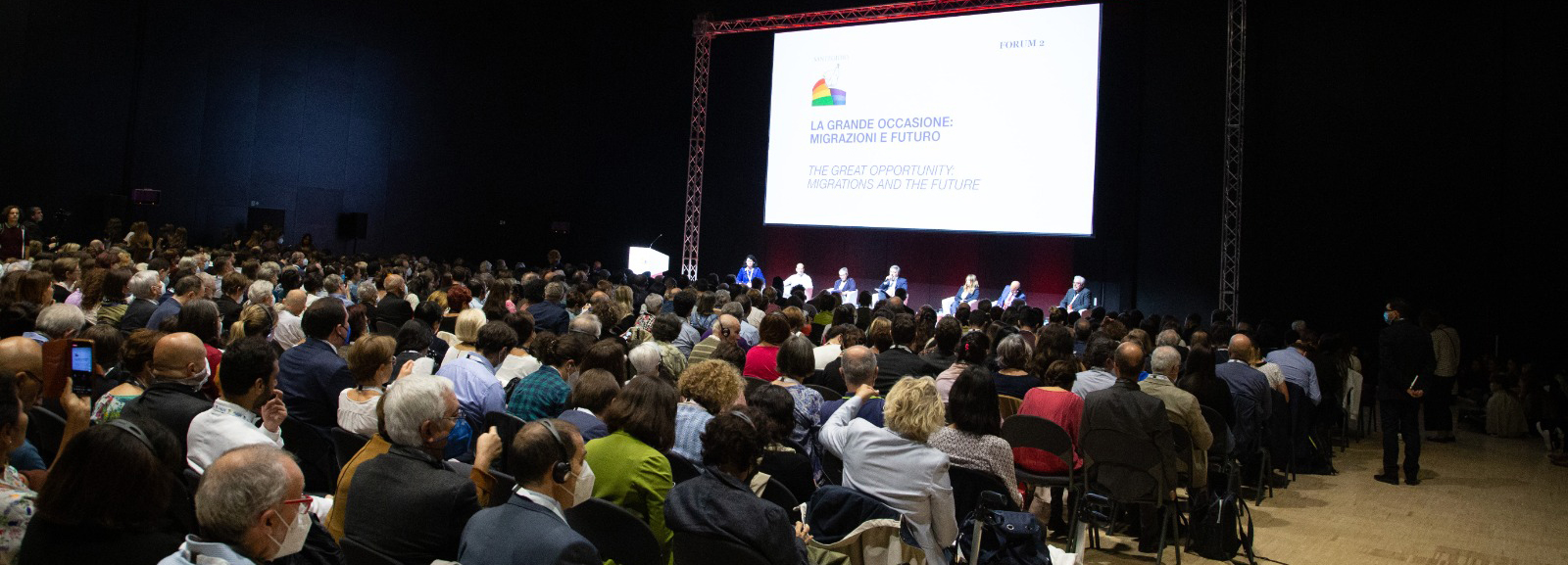
Modera
Marco Damilano
Editorial writer, Italy
Relatori
Fabio Baggio
Dicastery for Promoting Integral Human Development, Holy See
Slaheddine Jourchi
Journalist and Human Rights activist, Tunisia
Alicia Peressutti
Founder and Director of the Civil Association Vinculos en Red, Argentina
José Alejandro Solalinde Guerra
Director of Hermanos en camino, Mexico
09:30

Modera
Mario Marazziti
Community of Sant’Egidio, Italy
Relatori
Grégoire Ahongbonon
Activist for the Rights of Vulnerable People, Benin
Riccardo Di Segni
Chief Rabbi of Rome, Italy
Noorjehan Abdul Majid
Clinical Head for the DREAM Programme in Mozambique
09:30

Modera
Relatori
Frère Alois
Prior of the Community of Taizé, France
Abdulwahhab Ahmed Al-Taha Al-Sammaraee
Spokesman of Fiqh Council of Senior Scholars, Iraq
Ioan
Orthodox Metropolitan Bishop, Romanian Patriarchate
Shoten Minegishi
Soto Zen Buddhist monk, Japan
16:30

Modera
Relatori
Lucio Caracciolo
Director of "Limes", Italy
Jean-Dominique Durand
Historian, President of the Judeo-Christian Friendship in France
Christian Krieger
President of the Conference of the European Churches (CEC), France
Nico Piro
Journalist, writer and blogger, Italy
Dominique Quinio
Honorary President of "Semaines Sociales", France
Thomas Schwartz
President of Renovabis, Germany
16:30

Modera
Marco Gnavi
Community of Sant’Egidio, Italy
Relatori
Khajag Barsamian
Orthodox Archbishop, Armenian Apostolic Church
Iosif
Orthodox Metropolitan Bishop, Romanian Patriarchate
Kurt Koch
Cardinal, President of the Dicastery for Promoting Christian Unity, Holy See
Alberto Melloni
John XXIII Foundation for Religious Sciences, Italy
Anba Pola
Orthodos Metropolitan Bishop, Coptic Church of Egypt
16:30

Modera
Relatori
Abu al-Qasim al-Dibaji
World Organization Pan-Islamic Jurisprudence, Kuwait
Emilce Cuda
Theologian, Secretary of the Pontifical Commission for Latin America, Holy See
Daniele Garrone
President of the Federation of Evangelical Churches in Italy
José Tolentino Mendonça
Cardinal, Prefect of the Dicastery for Culture and Education, Holy See
Jong Chun Park
President of the World Methodist Council (WMC), South Korea
16:30

Modera
Vittorio Ianari
Community of Sant’Egidio, Italy
Relatori
Mohamed Abdelsalam Abdellatif
Secretary-General of the Muslim Council of Elders, Egypt
Zaid Mohammed Bahr AL-Uloom
Director of the Al-Khoei Institute, Iraq
Indunil J. Kodithuwakku
Dicastery for Interreligious Dialogue, Holy See
Ryoko Nishioka
Advisor to the Patriarch of Tendai Buddhism, Japan
Laurent Ulrich
Archbishop of Paris, France
16:30

Modera
Andrea Bartoli
President, Sant'Egidio Foundation for Peace and Dialogue, USA
Relatori
Martin Hellman
Professor, Stanford University, USA
Kerry Kennedy
Lawyer, Author and Human Rights Activist, USA
Peter Kuznick
Director of the Institute of Nuclear Studies of American University, USA
Adriano Roccucci
Roma-Tre University, Community of Sant’Egidio, Italy
Jeffrey D. Sachs
Colombia University, Special Adviser to the United Nations Secretary General
09:30
The Mediterranean is "a beautiful sea that has become a tomb for men, women and children," as Pope Francis recalled in Lesbos. From the heart of the great religions and civilizations that face it, diversity and the ability to be plural can become a secret of coexistence and human development for Europe, the Middle East, Africa, the world.
Modera
Valérie Régnier
Community of Sant’Egidio, France
Relatori
Jean-Marc Aveline
Cardinal, Archbishop of Marseille, France
Mohammed Esslimani
Theologian, Saudi Arabia
Tarek Mitri
President of Saint George University of Beirut, Lebanon
David Rosen
Rabbi, Special Advisor to the Abrahamic Family House (AFH) in Abu Dhabi, Israel
Olivier Roy
Orientalist and political scientist, France
Matteo Zuppi
Cardinal, Archbishop of Bologna, President of the Italian Bishops' Conference
09:30

Modera
Marco Tarquinio
Director of “Avvenire”, Italy
Relatori
Mario Giro
Columnist, Community of Sant'Egidio, Italy
Martha Ama Akyaa Pobee
Department of Political and Peacebuilding Affairs, UN
Jeffrey D. Sachs
Colombia University, Special Adviser to the United Nations Secretary General
Ettore Francesco Sequi
Ambassador, Secretay General of the Ministry of Foreign Affairs and International Cooperation, Italy
Olav Fykse Tveit
Bishop, President of the Norwegian Council of Churches
09:30

Modera
Emmanuel
Elder Metropolitan Bishop of Chalcedone, Ecumenical Patriarchate
Relatori
Lucas Pedrò
Missionary Movement of Francis, Argentina
Vincenzo Paglia
Catholic Archbishop, President of the Pontifical Academy for Life, Holy See
Louis Raphaël I Sako
Cardinal, Patriarch of Babylon of Chaldeans, Iraq
Serafim
Orthodox Metropolitan, Romanian Patriarchate
Din Syamsuddin
President of the Centre for Dialogue and Cooperation among Civilizations, Indonesia
09:30

Modera
Katherine Marshall
Vice-President, G20 Interfaith Association, USA
Relatori
Pinchas Goldschmidt
President of the Conference of European Rabbis
Margaret Karram
President of the Focolare Movement
Syuhud Sahudi Marsudi
President of Nahdlatul Ulama, Indonesia
Paolo Naso
Italian Federation of Evangelical Churches (FCEI)
Mohammad Sammak
Special Adviser to the Grand Mufti of Lebanon
Swami Sarvasthananda
Ramakrishna Vedanta Centre, India
09:30

Modera
Vincenzo Morgante
Director of Tv2000, Italy
Relatori
Martina Colasante
Government affairs & public policy manager, Google Italy
Antonio Ferrari
Journalist and writer, Italy
Enzo Fortunato
Director of the Press Office of the Holy Convent of Assisi, Italy
Giuseppe Giulietti
President of the Italian National Press Federation
Lucia Goracci
Journalist TG1, Italy
Stefano Orlando
Community of Sant’Egidio, Italy
16:30
17:00
FINAL CEREMONY
With the participation of Pope Francis and religious representatives
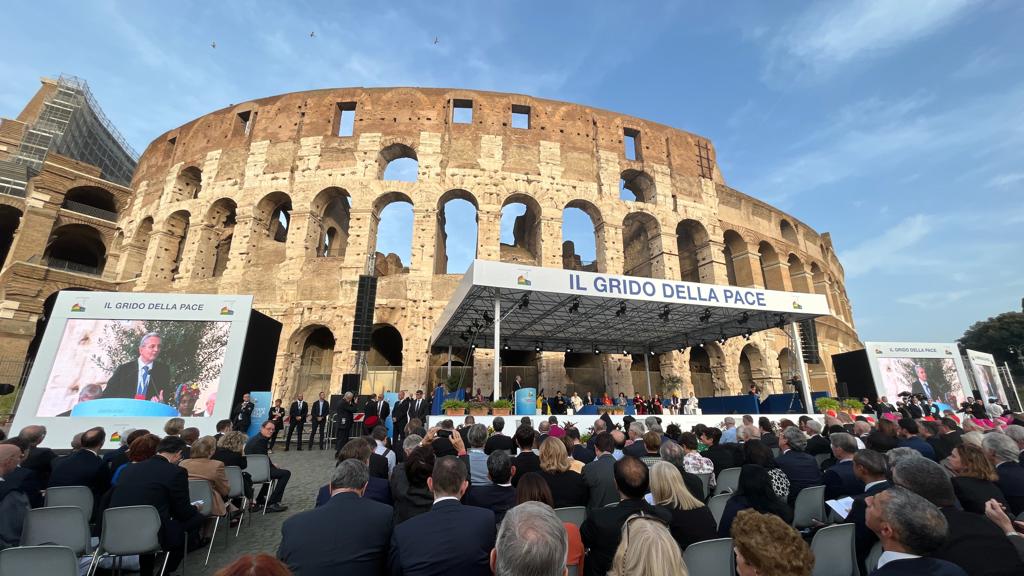
Contributions
Marco Impagliazzo
Historian, President of the Community of Sant’Egidio
Alicia Peressutti
Founder and Director of the Civil Association Vinculos en Red, Argentina
Contribution
17:30
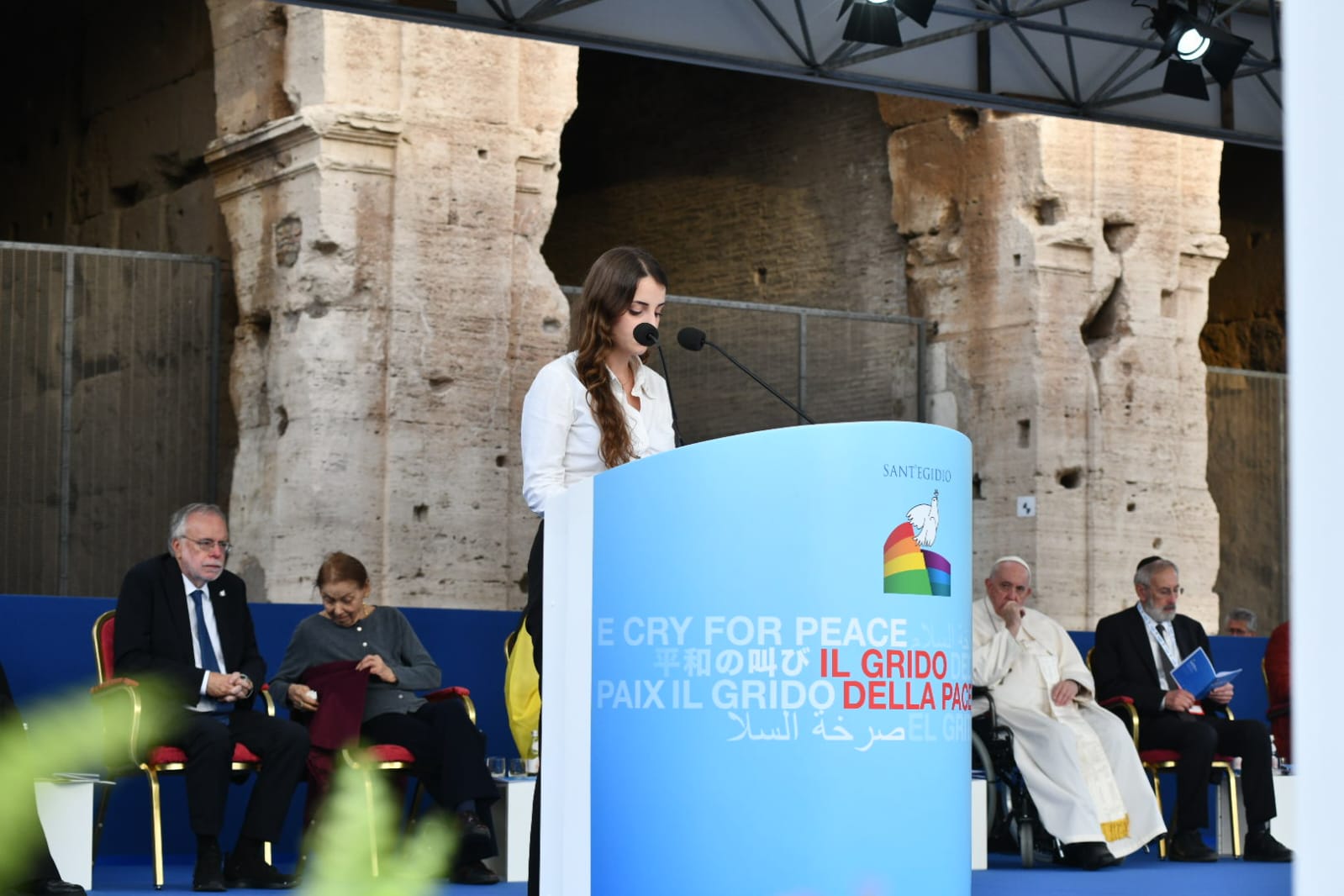
APPEAL
Social channels to follow the event
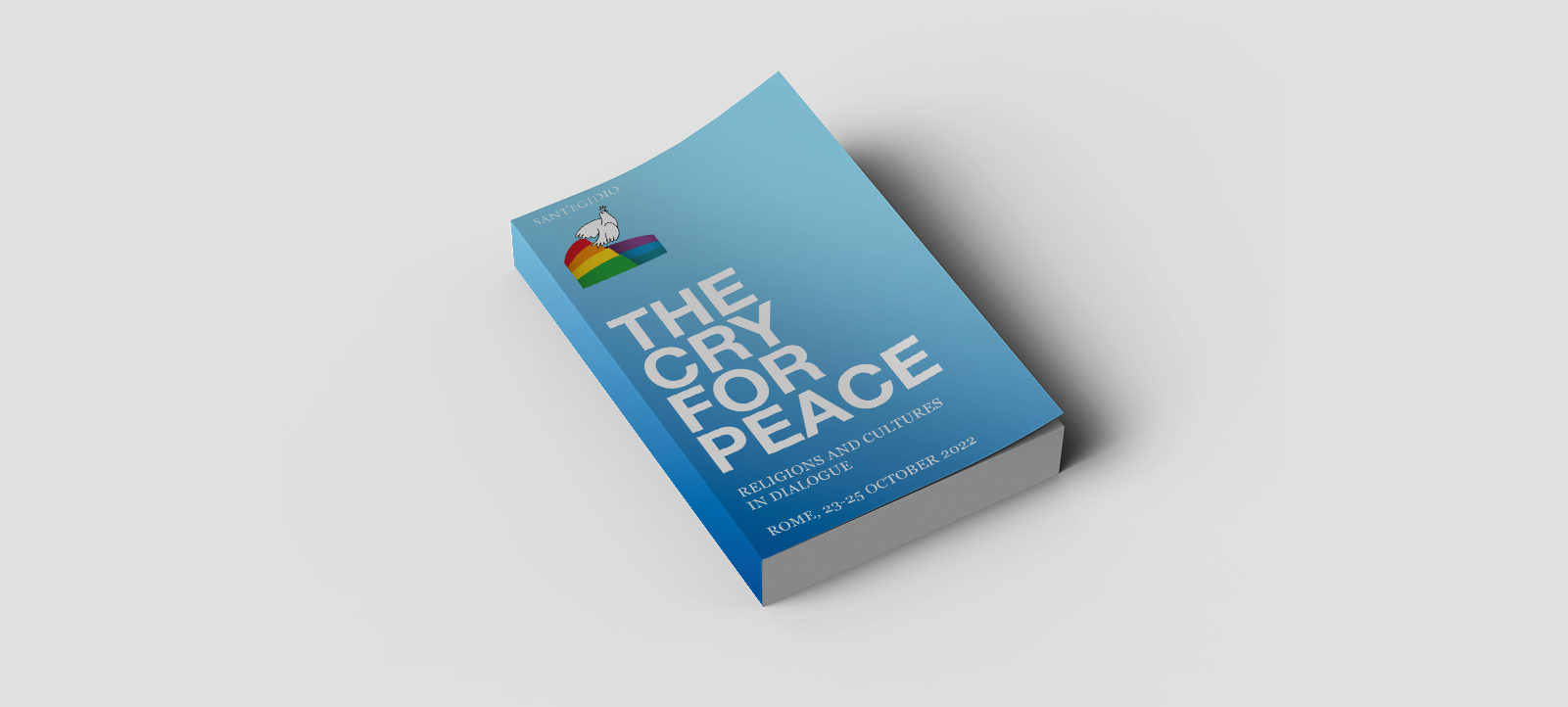

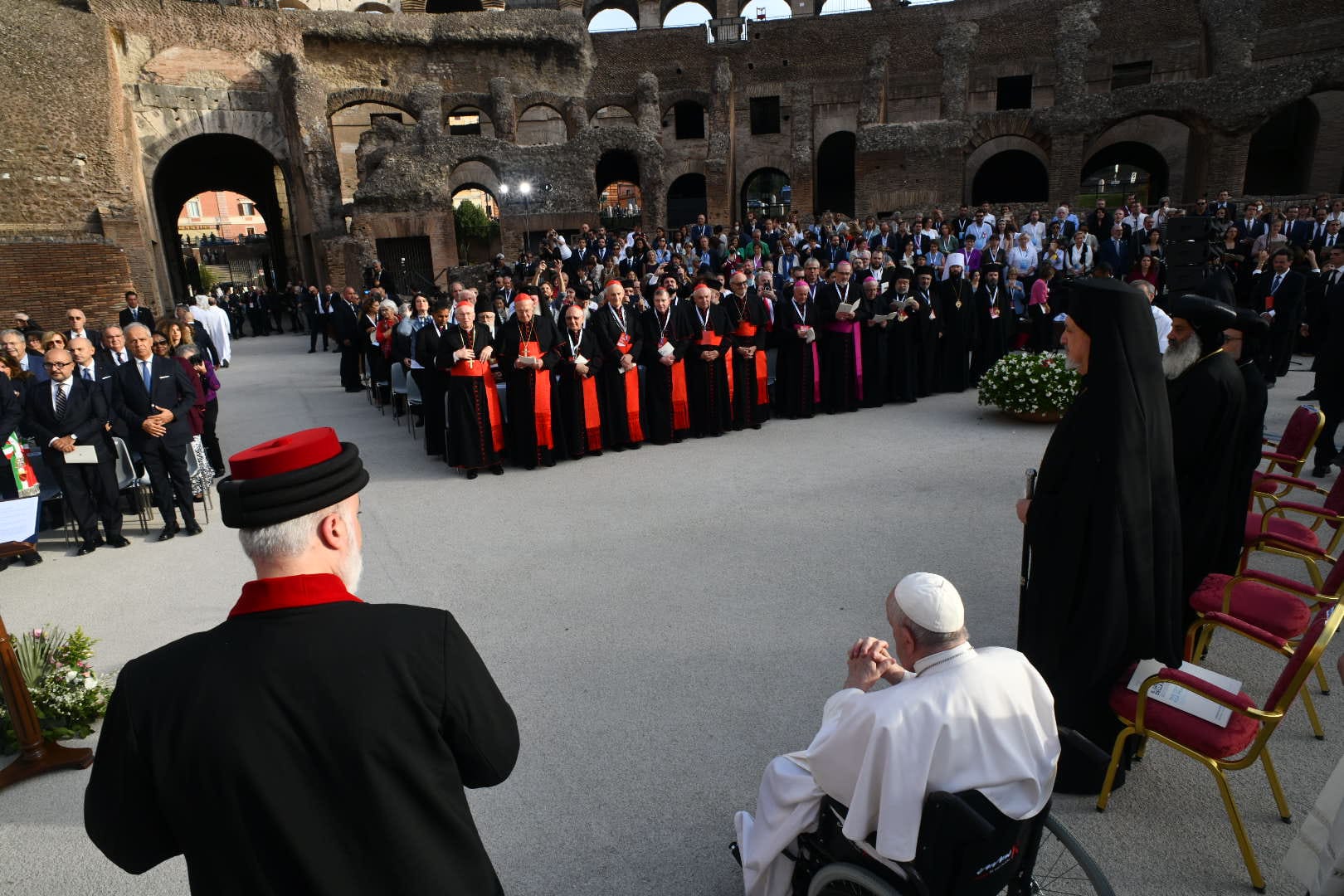
.png)
.png)
.png)
.png)

